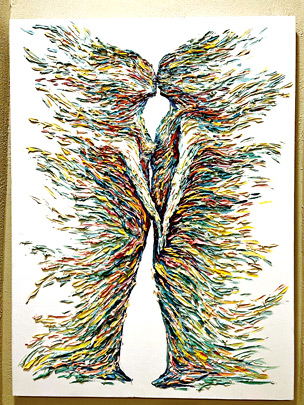Love

All thoughts, all passions, all delights,
Whatever stirs this mortal frame,
All are but ministers of Love,
And feed his sacred flame.
Oft in my waking dreams do I
Live o’er again that happy hour,
When midway on the mount I lay,
Beside the ruined tower.
The moonshine, stealing o’er the scene
Had blended with the lights of eve;
And she was there, my hope, my joy,
My own dear Genevieve!
She leant against the arm{‘e}d man,
The statue of the arm{‘e}d knight;
She stood and listened to my lay,
Amid the lingering light.
Few sorrows hath she of her own,
My hope! my joy! my Genevieve!
She loves me best, whene’er I sing
The songs that make her grieve.
I played a soft and doleful air,
I sang an old and moving story—
An old rude song, that suited well
That ruin wild and hoary.
She listened with a flitting blush,
With downcast eyes and modest grace;
For well she knew, I could not choose
But gaze upon her face.
I told her of the Knight that wore
Upon his shield a burning brand;
And that for ten long years he wooed
The Lady of the Land.
I told her how he pined: and ah!
The deep, the low, the pleading tone
With which I sang another’s love,
Interpreted my own.
She listened with a flitting blush,
With downcast eyes, and modest grace;
And she forgave me, that I gazed
Too fondly on her face!
But when I told the cruel scorn
That crazed that bold and lovely Knight,
And that he crossed the mountain-woods,
Nor rested day nor night;
That sometimes from the savage den,
And sometimes from the darksome shade,
And sometimes starting up at once
In green and sunny glade,—
There came and looked him in the face
An angel beautiful and bright;
And that he knew it was a Fiend,
This miserable Knight!
And that unknowing what he did,
He leaped amid a murderous band,
And saved from outrage worse than death
The Lady of the Land!
And how she wept, and clasped his knees;
And how she tended him in vain—
And ever strove to expiate
The scorn that crazed his brain;—
And that she nursed him in a cave;
And how his madness went away,
When on the yellow forest-leaves
A dying man he lay;—
His dying words—but when I reached
That tenderest strain of all the ditty,
My faltering voice and pausing harp
Disturbed her soul with pity!
All impulses of soul and sense
Had thrilled my guileless Genevieve;
The music and the doleful tale,
The rich and balmy eve;
And hopes, and fears that kindle hope,
An undistinguishable throng,
And gentle wishes long subdued,
Subdued and cherished long!
She wept with pity and delight,
She blushed with love, and virgin-shame;
And like the murmur of a dream,
I heard her breathe my name.
Her bosom heaved—she stepped aside,
As conscious of my look she stepped—
Then suddenly, with timorous eye
She fled to me and wept.
She half enclosed me with her arms,
She pressed me with a meek embrace;
And bending back her head, looked up,
And gazed upon my face.
‘Twas partly love, and partly fear,
And partly ‘twas a bashful art,
That I might rather feel, than see,
The swelling of her heart.
I calmed her fears, and she was calm,
And told her love with virgin pride;
And so I won my Genevieve,
My bright and beauteous Bride.
Words: Samuel Taylor Coleridge
Live Grilling

Bhikkhus, all is burning. And what is the all that is burning?
– The Buddha in Adittapariyaya Sutta – The Fire Sermon
– Birth, not death, is the hard loss
– Louise Gluck – Cottonmouth Country / Firstborn
The rickety old bus sped along taking them
The Uzbek migrant workers
Still weary from the toils of the day before
Still rubbing the dreamless sleep from their eyes
To the greener pastures of bricks and concrete
Where the modern-day slave drivers
Put them to work.
It was the self-same road that they’d travelled back and forth
Thousand times over and again
Familiar as the faintlines on their calloused palms.
If any foreboding was ever present there,
It was all invisible and impalpable like air.
The rags-to-riches success stories of migrants,
As much rare and random as embellished
(To the more discerning eyes and ears)
Perhaps inspired them to toil away in the scorching heat
Fleshing out the skeletons of skyscrapers
Or maybe, they were already disillusioned
And just wanted themselves and their families
To survive the morrow,
We cannotknow it for certain now, though.
The infernal fire caught the bus by storm
With them trapped inside
Like hapless fish being live grilled
The heartless wind fanned the mortal fury
of the steely flames.
The lucky five jumped out.
The hapless fifty-two were barbecued to death,
In a single pyre without ceremony.
We can blame it on inequality, karma,
Chance, or poverty or a thousand more reasons;
But, then, when does the Grim Reaper ever cease
To stalk and hunt us, its defenceless prey?
Like Gluck wrote, birth, not death, is the hard loss.
Words: Jayashantha Jayawardhana









